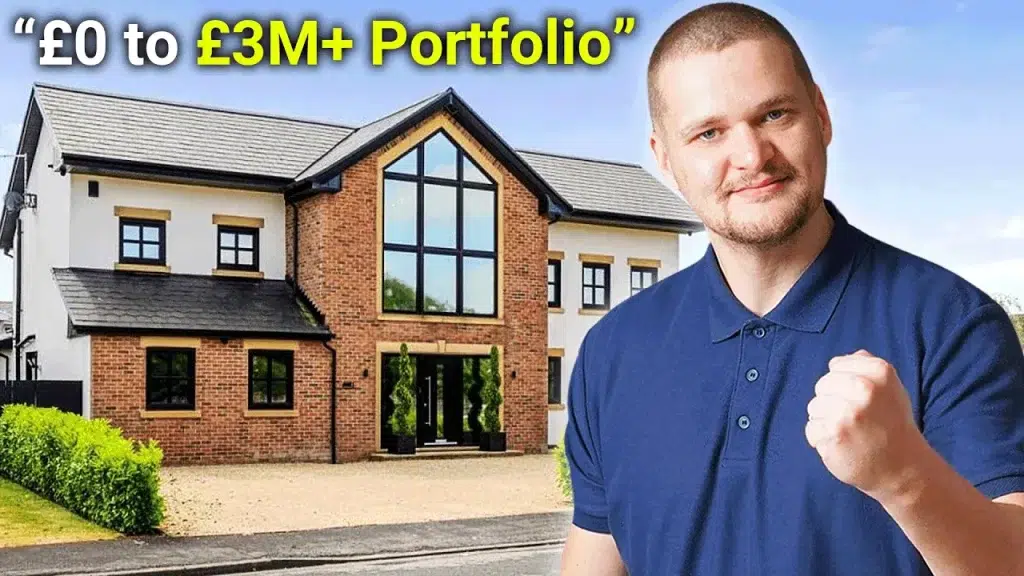Harley and Connor McLeod, from Kent, were already successful property developers when they enrolled on Samuel Leeds’ academy to ramp up their business. Now they have a rent-to-rent, on top of a portfolio of HMOs, and have learnt about marketing and creating a brand. Their five houses are valued at more than £3m and generate a monthly profit of £10,885
Connor and Harley’s property business turns over £24,190 a month
Harley was a mixed martial arts boxer with over 100 fights under his belt until a serious injury to his hand, which has since healed, forced him to give up the sport at the age of 17. Instead, he went to university to study business and management.
Midway through the course he and his brother decided to go into property. After finishing university, Harley went straight into the business.
The brothers wanted to build something together so that Harley could work for himself, and they could build a portfolio that would produce generational wealth for their family.
Connor’s background was in construction. He owned an engineering company for about 10 years before joining forces with Harley. After doing some training, the pair launched their new enterprise with some funds Connor had saved from his previous business.
Harley had time to grow their company, while Connor had experience. It was the perfect combination.
Their first deal was in 2018 when they purchased a two-bedroom buy-to-let for £42,000 in Blackburn after going there for a business meeting.
They paid for it in cash and then lived there for a month while they ripped it out. “Harley learned a lot on that job because it was his first build job. He learnt how to fit kitchens and bathrooms. From then on, we just built and expanded it. That was a baby stepping stone,” says Connor.
“We only spent £10,000 doing it up. That included all the expenses driving from Kent to Blackburn. We shopped around and got a kitchen from B&Q for £800 because it was on sale,” Harley recalls.
The pair manage all their projects and do as much work as possible themselves to minimise their costs and use the money saved to produce a high-end finish.
After the renovation, the property was valued at £68,000. It brings in £550 a month in rent and they pay £137 for the mortgage out of that.
Using the buy, refurbish, refinance strategy to recycle their cash, the entrepreneurs have done up seven houses in the past five years and sold two of them.
The turnover per month from renting out the properties is £24,190 which is ‘totally passive’ as they employ a letting agency.
It leaves them with a healthy profit of £10,885 a month after their expenses, with their portfolio continually expanding.
Brothers’ portfolio includes a 14 and 16-bedroom HMO
After completing the advanced training on the Samuel Leeds Academy, Connor and Harley had a one-to-one consultation with the company’s founder, Samuel Leeds. They attended his two-day Accelerated Coaching Performance Programme.
“We brought a guide of what we’d done and how we did it, telling our story from day one to where we’re going to end up, so Samuel could see it and discuss it,” Connor remembers.
Their mentor-in-chief was impressed, and they went away with an action plan of how to develop their business.
Self-management and motivation have been key in enabling them to scale up their operation in a relatively short time, Connor believes.
“At no point have we stopped. Through dead periods, we’ve gone out actively looking. Now we’ve got people ringing saying, ‘we’ve got an HMO available, it’s 24 beds. Do you want to buy it?’ Yes.
“So, we’re now bringing the work to us as opposed to finding it.”
They have moved on to bigger ventures, turning to investors and banks for funding.
Their proudest achievement was converting a pub/hotel in Sheffield into a 14-bedroom HMO.
“It needed completely gutting. So, the only thing we kept was the four walls,” says Harley.
They bought it for £310,000 and spent just under £400,000 on the conversion, substantially down from the original builders’ quote of £1m.
Connor says: “We refinanced at £1.1m, so effectively we got all our money out with a bit of cash left over to go into the next deal.”
The rental income amounts to £9,800 a month. With a 16-bedroom HMO also just coming on stream, their revenue is set to rise by another £9,500 per month.
Most of their properties are in Sheffield. They researched different places in the country and discovered that Sheffield was the most populated, fastest growing city.
“It’s the fourth biggest city in the UK, population wise. Not many people realise that. They’ve all got to live somewhere. There are plenty of students there and professionals, and there’s a lot of growth.
“When we first went, there were two cranes in the city. Now, there are towers going up everywhere. It’s the place to be,” Connor says.
Harley and Connor have also done two flips. Connor says: “We paid £310,000 for a three-bed terraced and sold it for £385,000 in the same year.
“The finish is what gets you the money ultimately but also the right areas. There are still areas in Sheffield where you wouldn’t want to buy houses. But in the right postcodes and the right roads, if you know where they are, you can smash it.”
Their portfolio is valued at £3,050,000, says Harley, but they have no plans to give up working just yet. Their aim is to achieve an end value of £1m on each deal they secure.
Harley and Connor have moved on from taking on four, five and six-bedroom house refurbishments as they believe the numbers no longer stack up. And so they are eying up ‘bigger numbers.’
They make the point that the paperwork is the same for a small or a large deal, and it is more economical when it comes to maintaining a bigger property.
“When you’re paying a builder for a day, you split that [cost] between 14 rooms. If that’s a four-bed, he’s still got to go out for a day, and you’ve only got four rooms to split it against. So effectively that month it wasn’t worth running,” Harley explains.
It has taken hard work and determination to get where they are now. During the renovation of a house, Harley spends the first fortnight on site. He then keeps a close eye on the tradesmen doing some of the work. That means early starts to get from his home in Kent to the north.
“It’s simple. I wake up at three o’ clock in the morning, travel up there and back the same day or stay overnight.”
They have also become astute at buying a property at a price of their choosing, rather than the asking price.
Connor says: “Rather than us having to haggle over a price, it’s more a case of saying it’s worth this. It’s a take it or leave it deal.
“The value is what we’re going to get it valued at [once the work has been done]. There is no other value that matters.
“When you factor in the refurb and it’s going to be empty for probably a year it doesn’t work. The costs have to reflect what needs doing,” says Connor.
Harley says the biggest mistake people make when buying and doing up houses is spending too much money and then employing the wrong builder.
“A lot of people buy a house and think they can give it to a builder and turn back up when the job’s done. If you don’t see it through the stages and just wait till the end, it might look nice but behind the scenes is what’s going to cost you money.”
If the plumbing and electrics are not done properly, that can be costly, and a lot of builders are unaware of the specific regulations governing HMOs, he points out.
Harley gives them a list of all the jobs that need to be done to keep within the rules.
“When you just put a normal builder in and say I want an HMO, you’re expecting them to do all the research on the requirements, such as fire doors. They haven’t got the time. And if the builder does know those requirements, he’s going to charge you for it, so the deal might not stack.”
Artificial Intelligence helps to identify opportunities in Article 4 areas
Harley and Connor have been shrewd in snapping up properties in Article 4 zones. Many property investors will avoid such areas because of the cap on the number of HMOs allowed.
The brothers, however, look for the pockets where there the ratio of HMOs to ordinary houses is no more than 20 per cent. Once they have identified a spot, they seek planning permission for a house share, knowing that it is likely to be approved.
The advantage of this tactic is that there is less competition. Initially, they pinned the local council’s register of HMOs on the wall of their office with a map to show the locations. Now, with the advent of artificial intelligence, they download a heat map to see where there is a concentration of properties with multiple occupants.
Connor says: “You can concentrate on the areas that haven’t got many HMOs inside the area, rather than the red zones which are saturated.
“We’ve made it work once on one of the deals. It took the standard six months to get planning permission, but it wasn’t a hard deal because we had the evidence.”
Gaining planning consent is not always straightforward. It took about nine months to win approval for their pub conversion scheme due to opposition from neighbours and a trade association.
“All the locals were against it, but they didn’t even know what we were going to produce. They were saying they didn’t want slums. Now there’s a neighbour two doors down who’s come and seen it and has nothing but positive things to say about it,” Connor says.
The duo bought the pub as a going concern and had to get a local planning consultant and an architect on board to help them with the application. As part of that process, Harley and Connor had to produce a viability report as to why it could no longer be run as a pub.
The conversion into a 14-bed HMO was finished two years ago and it is now valued at £1.2m because of the rents having gone up.
The business partners have worked out that in five years they have made about £850,000 in equity.
Since Connor and Harley met Samuel a year ago, they have taken on a rent-to-serviced accommodation property which is expected to make at least £1,000 a month.
“That’s the one thing I got from the academy that I wouldn’t have had before because I wasn’t looking at it. If I was starting again, I’d go down that road for cash flow,” says Connor.
On their training with Property Investors, they also learnt how to raise finance and put themselves out there to move their company, Hudson Harley Property, to the next level.
“A big part for me was the marketing. On the accelerator training it was simple, straight to the point and that’s what we came for,” concludes Connor.
Connor and Harley’s tips
- Training is key. Get a mentor. You might have the motivation but if you go in the wrong direction you’re not going up, you’re going sideways.
- Be willing to do what others aren’t.
Samuel Leeds’ verdict
“I love the way Harley and Connor have brought their skills together. They are proper grafters, as well as having the education and knowledge. I look forward to seeing their continued progression.”






